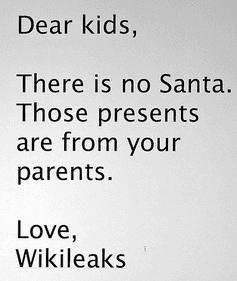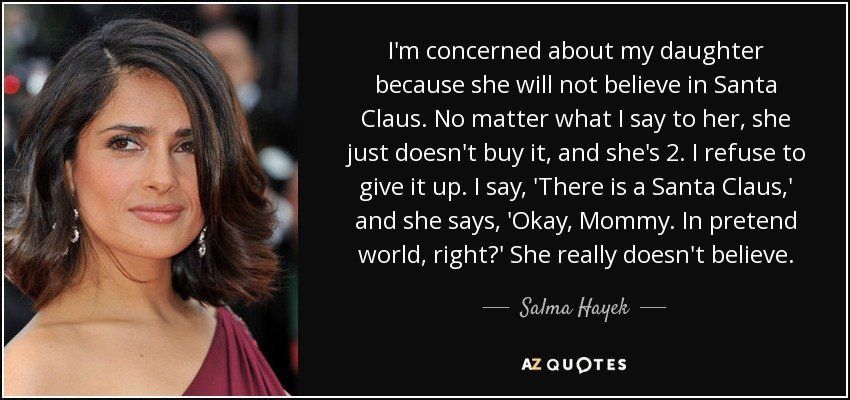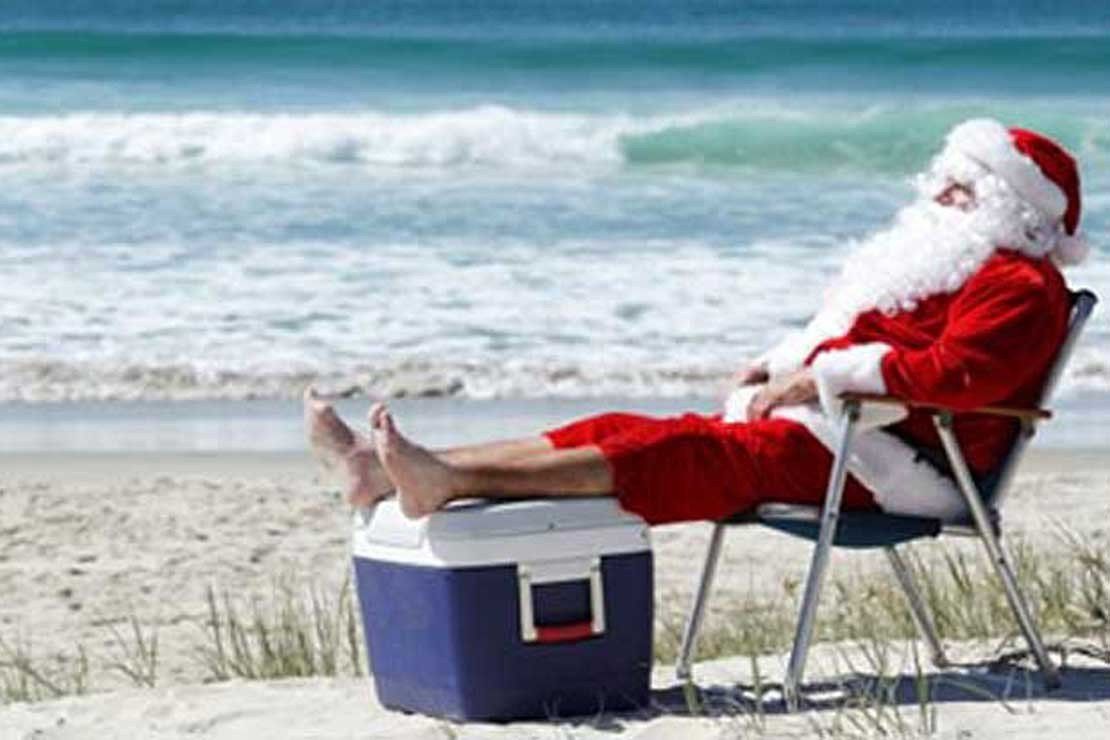Santa Musings
- By Robin Barker
- •
- 15 Dec, 2017
Should the myth of Santa – windswept beard and red hat flying, swooping onto roof-tops to deliver gifts to ‘good’ children – be perpetuated?

*
One of the enduring memories of my childhood is of my sister and me nestled in on either side of my grandmother as she played her piano and sang 'The Little Boy That Santa Claus Forgot'. Upset by Santa’s thoughtlessness and the little boy’s plight, we’d collapse into tiny heaps of trembling lips and overflowing eyes even as we begged her to please, please play it again.
He's the little boy that Santa Claus forgot,
And goodness knows, he didn't want a lot.
He sent a note to Santa
For some soldiers and a drum,
It broke his little heart
When he found Santa hadn't come.
In the street he envies all those lucky boys,
Then wanders home to last year's broken toys.
I'm so sorry for that laddie,
He hasn't got a daddy,
The little boy that Santa Claus forgot.
Tommie Connor / Michael Carr / Jimmy Leach
*
A Potted History
Santa is a very powerful tradition associated with Western Christian culture around the world originally linked to Saint Nicholas, a benevolent bishop in the 4th Century CE, who gave generously, and often anonymously, to the poor and needy.
The original aim of the St Nicholas Feast Day (an annual religious celebration, not a big meal), was to honour St Nicholas whose life was a model of compassion and charity. Any emphasis on family giving - as opposed to giving to the poor and needy - related to small treats and family fun.
In England during the 16th C, Saint Nicholas’s Feast Day was moved from 6th December to Christmas Day, a change that was gradually taken up by most Western countries.
The modern child-centric Santa bringing gifts to ‘good’ children arrived in the 1850s and since then the tradition has been passed down to increasingly more affluent generations until we’ve reached the extravagance and madness of today, which seems to have moved a long way from the spirit of generosity and love fostered by the original Saint Nicholas.
For a growing number of people in wealthy secular Western countries, Santa has become a non-religious cultural figure that has very little to do with the birth of the long-awaited Messiah to a disadvantaged family living in temporary accommodation sleeping on straw, surrounded by animals.
At its best the Santa tradition stands for love, benevolence, kindness
and joy and what adults like to think of as the innocence of childhood. The Santa image also has a
strong association with charity and philanthropy.

*
For some Christians, and other faiths, Santa is objectionable because he has become a symbol of materialism that detracts from the spiritual message of Christmas.
For many other families Santa is excitement and fun. A childhood without
the preparations, the anticipation, the joy of Santa is unimaginable.
Once, for most families, Santa’s gifts were modest. In eras when children didn’t receive much most of the year, Christmas was a time when clothes, books and other necessities (as well as one or two toys) were given.
Of course, there were always a few children from wealthier homes who received expensive presents (like the bikes and watches and transistor radios that I was so wildly jealous of), and conversely many children who received next to nothing, a big problem for any observant child about the inequality of Santa’s benevolence.
While there are still families where Santa’s gifts are humble and helped along by charitable organisations, many children receive shopping-trolley loads of stuff they lose track of.
How often do we hear the adult’s plaintiff cry…’they
get too much.’
And, ‘they open everything and then say…is
that all?’
Many kids now don’t have to hang out until
Christmas for highly desired things. As a steady flow of goodies comes their
way throughout the year, Santa is left scratching his head, wondering what might fit the bill this year.
*
Perpetuating the myth relies on lies which, to keep the myth alive, need to become more and more elaborate and phoney as children fairly quickly become sceptical about the details.
This probably means that many children – for fear of not getting presents or in order not to upset their parents – go along with the idea long after they work out it doesn’t make sense.
After all it’s not rocket science. The
fiction has holes big enough to drive a sleigh through.
All those different Santas in department
stores; the dubious logistics of Santa visiting every child on the planet; Santa
stuffing himself with the goodies left at every single home; elf-manufactured
toys that look suspiciously like the ones at Toys-R-Us…and so on.
In these times of wall-to-wall screens, and the much wider exposure children now have to the world and its people, it’s hard to believe that any child much older than five, really thinks that the pile of presents at the foot of the bed comes via a workforce of elves and a jolly bloke from the North Pole who drives a team of reindeer through the sky.
I think we have been brainwashed into believing that the Santa myth is every child’s birthright to such a degree that most parents never consider the possibility that their children might get as much pleasure from knowing that their parents are the ones responsible for the presents. Even if the thought of raising children without Santa strikes a chord with some some, fear of being ostracised as a miserable Scrooge (or worse) by other parents and family members tends to keep such unpopular views in check.
It’s far easier and more acceptable to raise
children not to believe in God than not to believe in Santa.
*
Thinking it through
Surely Christmas can still be enjoyed with the tree, the lights, the
cards, the carols and the gathering of family and friends without pretending
that it is Santa who brings the presents? I could be wrong, but I think
children, told from day one, would happily accept that the presents come from
their parents.
There’s no need to abolish Santa. His story can be told, relating it back to St Nicholas and his good works, without the embellishment of pretending he lives in the North Pole and visits ‘well-behaved’ children once a year in the middle of the night to drop presents upon them.
Of course, as part of the honest approach, children would need to know that other families treat Santa as real and parents would have to give good reasons - related to the child’s age - as to why they prefer not to go along with the myth.

*
Four Santa Stories
‘We were very poor when I was a child and we only ever received one or two small presents from Santa. We lived in a quiet suburb where everyone knew each other and on Christmas morning we’d all tumble out onto the street to show each other what Santa had left.And I could never understand why some kids got so much and others got next to nothing.’
‘I used to get gifts from my aunty and I was always told that Santa had left the gifts for my aunty to pass on to me, which I thought was really weird. I used to be instructed by my parents to ask aunty to thank Santa for me. I did as I was told but I was always embarrassed because I knew that the gift had, in fact, come directly from my aunty and I never knew why we had to pretend otherwise’
‘We were the children of Holocaust survivors living in Adelaide. My two sisters and I were the only Jewish kids at the local school. Our parents explained that Jews didn’t do Santa. They weren’t disparaging about Santa, but they did tell us that the story wasn’t real and that it was the parents who left the presents, not Santa. It didn’t bother us at all. I didn’t discuss it at school or tell kids that Santa wasn’t real because I was popular and didn’t want to do anything to lose friends.’‘
My husband and I thought the whole Santa thing
was a pile of rubbish and agreed that we wouldn’t do it. We always had the tree,
the decorations and all the festivities but our son knew that it was us who left
the presents. We came in for a lot of criticism from friends and family, but water
off a duck’s back. My son has never given us any indication that a Santa-less upbringing
mattered to him in the slightest.’
*
Santa visited me when I was a child but I twigged very early (not quite as early as Salma's two-year-old) and my parents told me straight away what the real story was. I remember being overcome by their generosity. I have no recollection of any associated weepy trauma nor of any regretful Santa moments. I have a vague feeling that I knew all along so it wasn't a big surprise, although seventy years down the track that might just be wishful thinking in view of my rethink about the Santa story we foist upon our kids.
We went along with it with our children because it didn't occur to us to do otherwise. As soon as they asked or even hinted we told them the truth. I don't think it bothered them one way or another. I suspect if I had my time again I wouldn't do the Santa thing for all the reasons I've written about.

*

Robin Barker: Baby Love, The Mighty Toddler, Close To Home